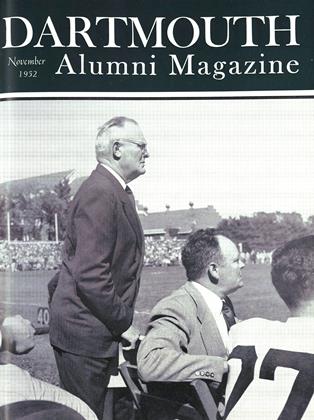WHERE do most of the nation's college and university instructors in modern languages get their undergraduate training? In universities which offer graduate work for later specialization in this field, or in liberal arts colleges without graduate programs leading to the advanced degrees?
A recent survey conducted by the American Council of Learned Societies and the Modern Language Association of America points up the frequency with which these scholars receive their early training in colleges such as Dartmouth, which do not themselves offer a program of advanced study.
Dartmouth, among all colleges and universities, ranks thirteenth (along with Wesleyan) as the source of undergraduate training for Modern Language Association members. Among undergraduate colleges alone, as distinguished from universities, Dartmouth and Wesleyan are in third place after City College of New York and Oberlin among the shapers, at the undergraduate level, of American scholars in modern languages.
Dartmouth's role in educating scientists was described in an article appearing in the DARTMOUTH ALUMNI MAGAZINE in March 1951, at which time it was pointed out that among all institutions Dartmouth ranked eighth as the undergraduate college of men receiving doctorates in geology and 27th among those granting baccalaureate degrees to chemistry Ph.D.'s. As the baccalaureate source of 82 science doctorates awarded in the period 1936-1945, Dartmouth stood 32nd among 679 institutions of all types and third among 555 institutions other than "nationally accredited universities of complex structure."
 View Full Issue
View Full Issue
More From This Issue
-
 Article
ArticleOn Educational Policy
November 1952 By PROF. ANTON A. RAVEN -
 Article
ArticleThe Business of Being a Gentleman
November 1952 -
 Class Notes
Class Notes1918
November 1952 By ERNEST H. EARLEY, DONALD L. BARR -
 Class Notes
Class Notes1929
November 1952 By F. WILLIAM ANDRES, EDWIN C. CHINLUND -
 Article
Article"The Greatest Sport"
November 1952 -
 Class Notes
Class Notes1921
November 1952 By REGINALD B. MINER, ROBERT M. MACDONALD
Article
-
 Article
ArticleSOUTHERN STATES
June 1925 -
 Article
ArticleFLORIDA ALUMNI GROUP CLAIMS ALTITUDE RECORD
March, 1926 -
 Article
ArticleNATIONAL STUDENT FEDERATION DISCUSSES COLLEGE PROBLEMS
JANUARY, 1927 -
 Article
ArticleCALISTHENICS: 0715 HOURS
April 1945 By Edward Rasmussen '42 -
 Article
ArticleVarsity Schedules
DECEMBER 1969 By JACK DEGANGE -
 Article
ArticleFACULTY HELMSMAN
June 1947 By JOHN P. STEARNS '49

